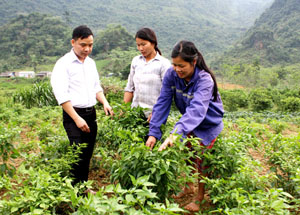



Bui Van Than, a resident in Re hamlet of Phu Luong commune (Lac Son district), instructs farmers on how to care for mountain chilli plants.
That young man is Bui Van Than, a resident in Re hamlet of Phu Luong commune (Lac Son district). Born in 1983, Than chose his own way while his peers were absorbed in trips to the south or other localities in the northern region. In 2005, Than borrowed his uncle’s land use right certificate and put it up as collateral for a bank loan of 10 million VND (440.7 USD) to open a grocery. Thanks to his adaptability, the store has been a stable source of income for Than’s family since 2007.
Regarding pickled mountain chillies, which are now in demand, Than said: "Pickled mountain chillies are very popular in each family meal. Compared to other chilli varieties, mountain chillies (also called "khoi” chillies by Muong people) are small with strong, but not sharp, and hot taste. They are very crispy and scented when pickled. I saw many people selling bottles of pickled chillies and enjoying good sales during trips to Re street in Yen Nghiep commune (Lac Son). I thought why not chillies to produce pickled chillies.”
After that, Than learned how to make pickled chillies from the elderly so his products would taste traditional. He said: "To produce a bottle of quality pickled chillies that looks attractive, it is necessary to start pickling immediately after the green and fresh chillies are picked. The other ingredients are salt and lime juice. Chillies and one-quarter of a lime mixed with salt are put into a 350ml bottle, and they are ready to be served after a month. Using this method, the chillies maintain a yellow colour and crispy taste for two years without any preservatives,” he added.
Quality makes a brand name. The pickled chillies with the name Phu Luong Thuong Than on the bottles quickly became popular in Hanoi and other northern provinces.
While just more than 1,000 bottles were sold in 2015, the number rose to more than 10,000 the following year. Each chilli bottle costs 20,000 – 40,000 VND (0.88 – 1.76 USD), generating more than 300 million VND (13,200 USD) in income. Than plans to raise this number to more than 20,000 in 2017. To that end, he is growing seedlings for locals to plant in mountains. His chilli growing area has expanded to more than 3ha. At a price of 100,000 VND (4.4 USD) per kg of raw chillies, many households in Phu Luong commune have high hopes for mountain chillies.
Aside from chilli products, Than is also developing other specialties such as ruou can (wine drunk out of a jar through pipes) and dried buffalo meat. With total income of about 1 billion VND (44,000 USD) each year, he affirmed that if a person is determined to do business, educates themselves and adapts to market demand, he or she can become rich right in their home village.
"Than is an example of economic success of the commune. The development of the cultivation area and mountain chilli products has potential. Phu Luong has seven hamlets next to the mountain while some others are also favourable for chilli farming. If Than develops his business on a bigger scale, it will be a practical economic development plan for local residents,” Vice Chairman of the Phu Luong communal People’s Committee Bui Van Au said./.